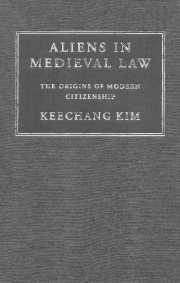5 - Birth beyond the sea
Published online by Cambridge University Press: 08 July 2009
Summary
So far, we have discussed foreign merchants' acquisition of land and mercantile liberties, foreign clerks' control of ecclesiastical benefices and foreign religious houses' legal position as tenants of lands in England. Up until now, we have been able to avoid the question of inheritance because we were focusing on foreign merchants' initial acquisition of land and mercantile liberties; because ecclesiastical benefices were not treated as inheritable during the period that concerns us; and because religious houses do not die or have children. Discussion of lay landholding relationships, however, will invariably fall back on the question of descent and inheritance. We discuss it now.
PROOF OF DESCENT
Sir Anthony Fitzherbert, a renowned Common Pleas judge in the sixteenth century, made the following remark on the significance of the writs in the common law: ‘Note that the writs are the principal and primary things in our law, by which man recovers what has been wrongly detained from him, and they are the foundation of each lawsuit.’ To commence a procedure, the learned judge added, one ought to have a good writ, for otherwise all the rest would be worthless. What is a good writ? The answer will amount to a full history of the development of the common law. Fitzherbert was certainly not interested in the historical investigation of the writ procedures and the development of the common law.
- Type
- Chapter
- Information
- Aliens in Medieval LawThe Origins of Modern Citizenship, pp. 103 - 125Publisher: Cambridge University PressPrint publication year: 2000

